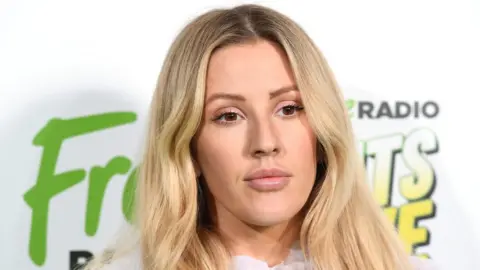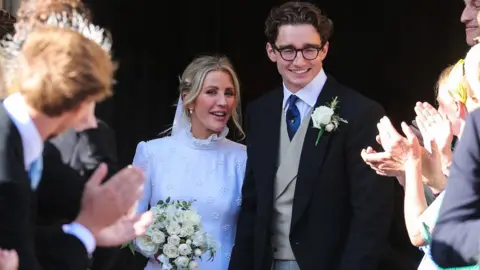Ellie Goulding: 'I used alcohol to be more funny and interesting'
 Getty Images
Getty ImagesEllie Goulding has revealed she turned to alcohol after struggling to adjust to life in the spotlight.
"I had to be a fake person to deal with the surreal situation I was in," the pop star said.
"Usually for me it involved alcohol. I assumed I couldn't be good enough, smart, funny, or crazy enough to be with certain people without it."
The singer made the comments while appearing on Fearne Cotton's Happy Place podcast.
Allow X content?

As well as admitting to drinking alcohol prior to interviews, the 32-year-old also revealed she turned to booze before appearing on Radio 1's Live Lounge - which is usually recorded in the morning.
"Live Lounges used to be the most nerve-wracking, I even drank before those.
"I would say, 'Right, I've got to drink this morning because I've got this interview and I don't really know how to answer the questions, because I don't really know who I am any more.'
"I thought drinking would at least make me a bit more funny, or interesting," Ellie Goulding said.
Allow Google YouTube content?
However the double BRIT Award winner - who performed at the Duke and Duchess of Cambridge's wedding reception in 2011 - says she never had an alcohol problem.
"I wasn't an alcoholic," she said. "I could go months without a drink, too."
Ellie Goulding released her chart-topping debut album, Lights, in 2010 which was followed by Halcyon in 2012 and Delirium in 2015.
In 2016, she announced she would be taking a break from music but not quitting permanently.
 Getty Images
Getty ImagesThe singer also told Fearne Cotton that she'd had therapy to try and deal with anger issues.
She revealed her marriage to old Etonian Caspar Jopling in August has helped calm her emotions.
"When I met Caspar, this anger thing just went away.
"At first it didn't. I did that thing we all do when we first meet someone you really like and you....don't possibly show any of your bad traits.
"With Caspar I instantly felt calmer," she added.
If you've been affected by any of the issues in this article there is help via the BBC Advice pages.


